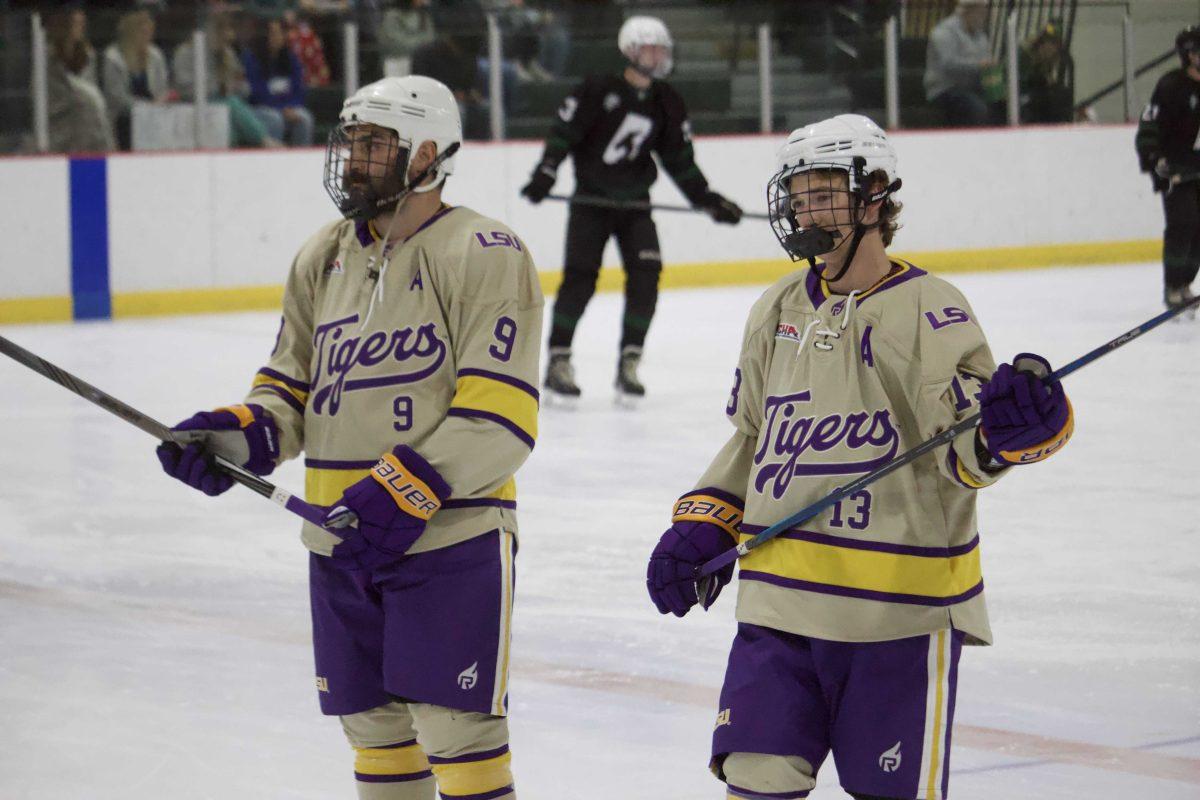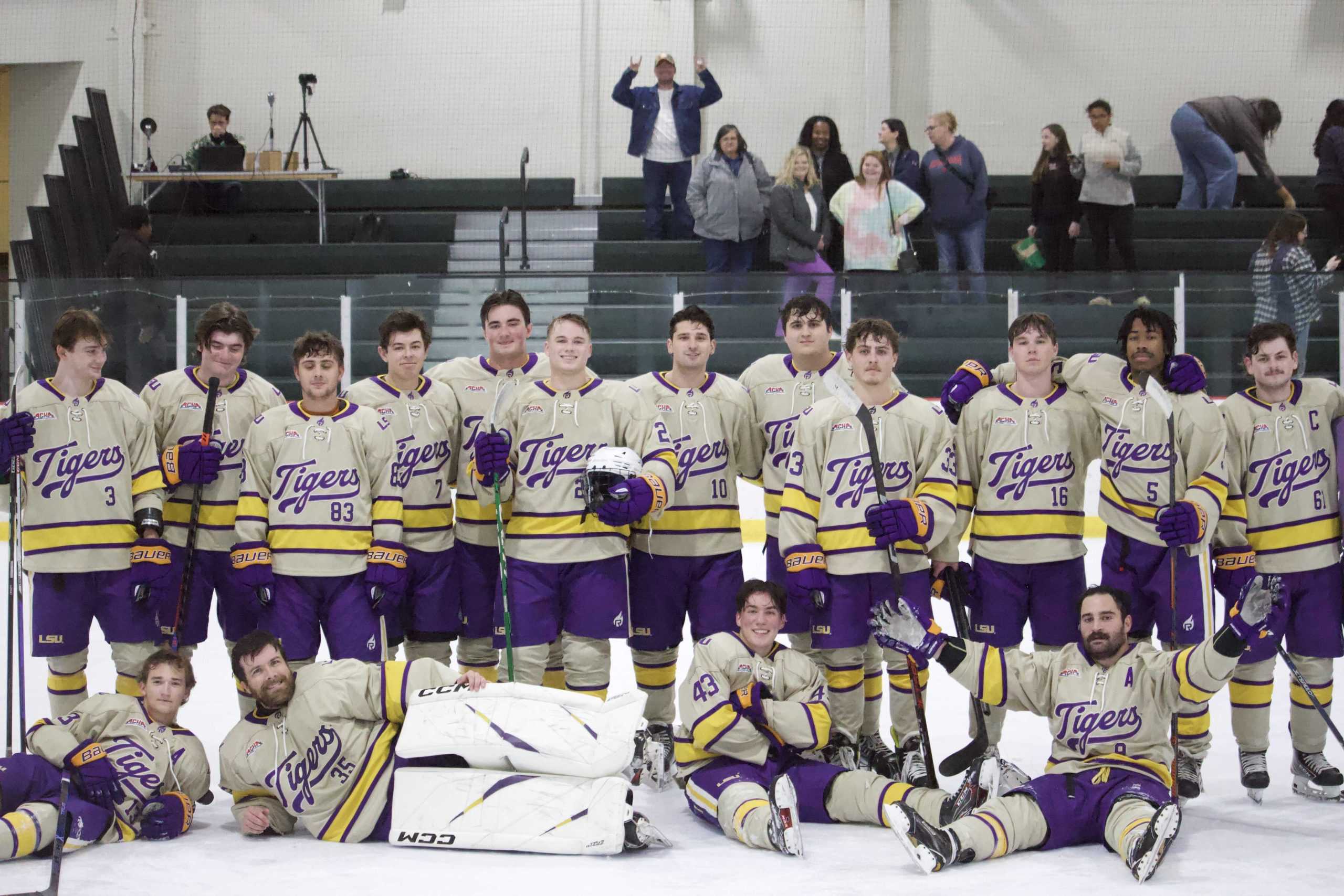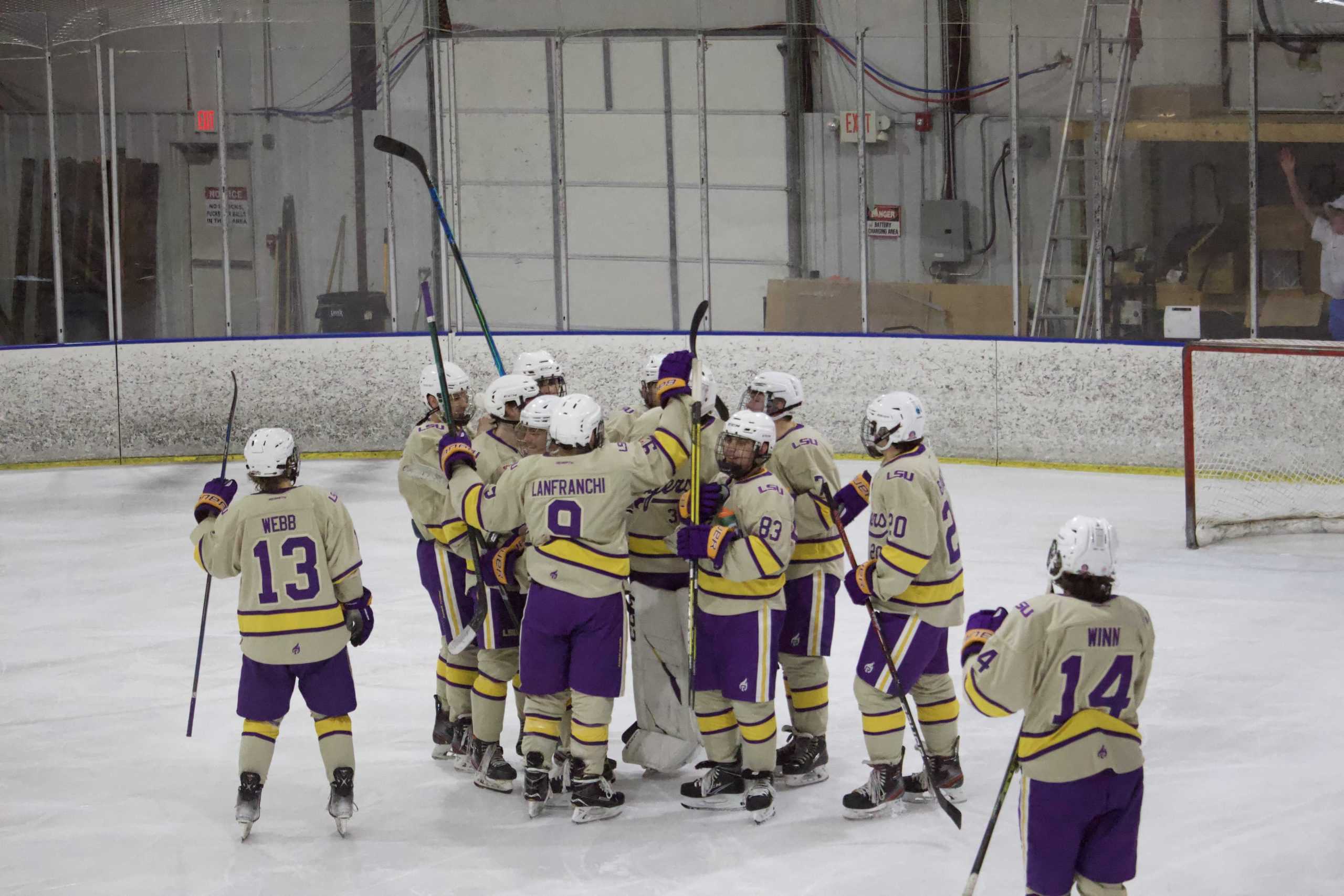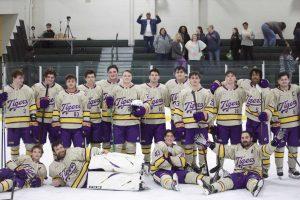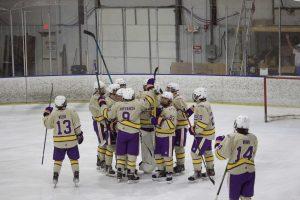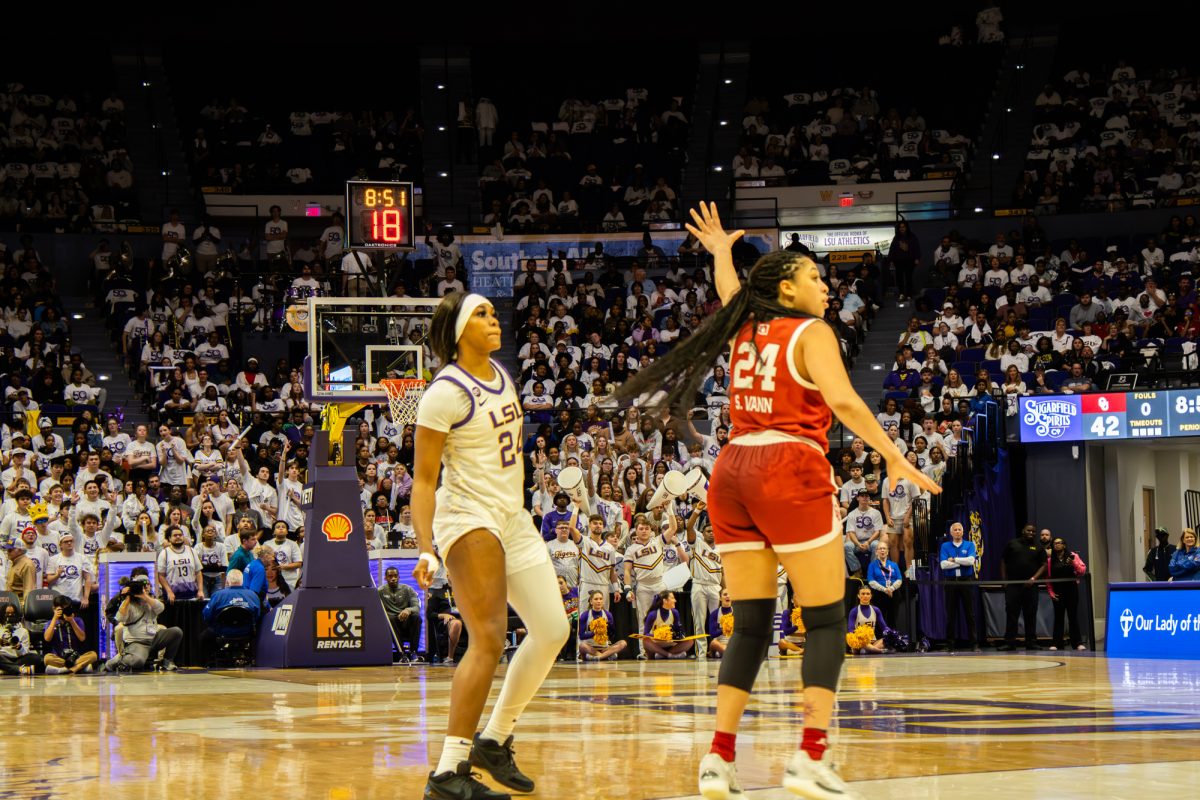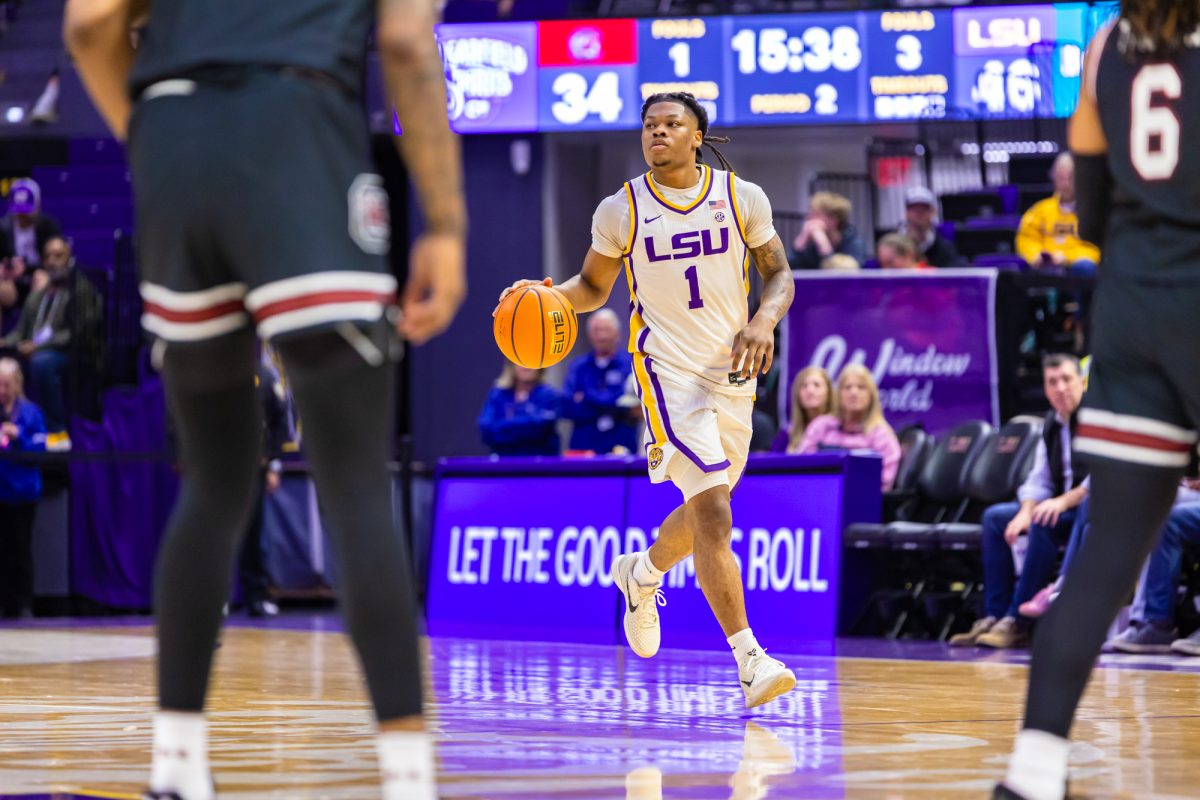Swamps and bayous, mud and gators, crawfish and lakes: Louisiana is the home of warm winters and scorching summers. Although the state is unfamiliar with ice, LSU’s newest and hottest club is bringing the coldest sport back to Louisiana.
To preface, hockey is nearly impossible to promote across the southern United States. Natives to the region hardly ever watch hockey; they grow up in warm climates, so ice sports are typically left off their agenda. The culmination of unfamiliarity and lack of interest makes hockey challenging to market in the South.
It’s also what partially prevents institutions from adding the sport. For instance, why would a school such as LSU add hockey to its catalog, knowing fans lack interest in it? It would be a financially poor decision.
On top of the costly risk hockey is, it could also sour public relations. The cost of a new sport, at minimum, typically has many layers that add up over time.
These layers include adding staff to payroll, paying for equipment, providing funding for scholarship athletes, travel and boarding costs, practice and leasing costs — the university will need a place to practice and perform until they have a rink and, should they opt out of renting a venue, will need to pay for constructing a new rink.
Even if a program is comfortable taking on these massive expenses, the final total could potentially be increased in order to stay Title IX compliant. If an institution doesn’t have the female participation required to make a women’s team, then they could have to create another female-only sport entirely to satisfy Title IX’s first clause.
Considering, within the southern region, the lack of understanding and involvement surrounding hockey and the financial challenges it brings, it’s unlikely any major SEC schools will be announcing their D-I hockey programs anytime soon.
And after LSU’s previous club hockey team disbanded in 2018, it seemed even more unlikely that the Tigers would be prowling on ice anytime soon.
However, a group of LSU students recently brought life back to the program. The club’s revival has created waves among LSU fans on X (formerly Twitter) and could be the turning point for hockey within the south.
For starters, with the Hockey team being a club sport, LSU has almost no financial obligations to the team. The club receives some benefits from the university’s recreational center; however, the bulk of the budget comes straight from the players pockets.
Secondly, the team’s identity is something that could resonate with every LSU fan. The club has had to fight on every step of their journey. They’re constantly overcoming new hurdles, yet despite each challenge, they’re still finding ways to beat teams and find success. This team is putting the fight in Fighting Tigers.
Even with each player having to sacrifice so much, none of them want to give up. The team is optimistic about their future and has built a strong brotherhood with each of their members. It’s clear they care about the future of the program and the success of their fellow players.
Anyone can play, anyone can love the sport; it’s what has driven each of the athletes on the team to fight for the club, and it’s what has created a connection across the entire program.
Aside from the team wearing purple and gold, their camaraderie and shared affection for the sport makes you want to root for them. They’ve built a strong team chemistry, which can be observed across discussions held with the players.
Jacob Panzer, a Maryland native, is currently the team’s center and secretary. He’s played hockey for 17 years because of his passion for the sport and the community it creates.
Two years ago, whenever he heard there was a possibility LSU would have a hockey program, he decided he couldn’t pass on the opportunity.
“I wanted to show and grow the game as much — especially for people who love the game down here who didn’t have access to it before,” Panzer said.
Each of the players’ stories is unique, but their dedication to the sport creates a special bond across the entire team. Although it wasn’t intended, Panzer’s reasoning for getting involved could resonate with several members on the program.
Ethan Webb, the program’s vice president and left-wing, is a Baton Rouge native. He started playing hockey at seven years old. Even with the previous club’s late schedule, Webb would stay up and attend the games.
He remembers going to games at 9 p.m., against Tulane, being the only kid in the arena. Yet, despite the odd environment, Webb still remembers “wanting nothing more than to play on that team.”
However, in 2018, the club he loved to watch growing up had disbanded. On top of that, Baton Rouge’s local rink, Leo’s, had also closed down. Webb had assumed his hockey days were practically over.
That was until right before he came to LSU. Prior to him stepping foot onto campus, Webb had gotten in contact with the new club’s president. Hearing rumors that the program would be revitalized, he knew he had to get involved.
His initiative led him to meet several other members on the executive board, including Panzer. And, while the program didn’t have the participation to be named a club over the first while, eventually the hockey team was born.
Webb isn’t the only member, either, who has had to come face-to-face with their future in hockey. In fact, Lanfranchi — another member on the executive board — played college hockey prior to attending LSU.
Club sports function the same way all collegiate sports do, with each player receiving four years of eligibility. Anthony Lanfranchi is a graduate student at LSU, currently pursuing his PH.D.
He previously attended a college in Pennsylvania where he also played hockey. After graduating, he had assumed his eligibility had run out. However, due to some technicalities from the COVID-19 pandemic, Lanfranchi was able to continue playing.
While he initially got in contact with the team to take on a coaching role, his discovery of eligibility caused him to suit back up. He’s also working with the executive board in an assistant role to help provide the team guidance. Lanfranchi’s goal is to provide insight so the team can avoid unnecessary hiccups that he’s encountered before.
Across the entire team, each of the members are all incredibly selfless. Nobody on the executive board wants to take credit, with Webb and Lanfranchi attributing most of the success to the incoming freshman classes, such as players like McNair.
“What made it all come together was the guys. The younger freshman that came in… it’s easy to say, ‘okay the executives did this,’ that’s completely false. Without the whole team, it would not be possible,” Webb said.
Lanfranchi shared this idea stating:
“I think LSU is a really good group of guys, where they bring a lot of finesse and skill, a lot of personality and a lot of grit.”
Grit is certainly required to be a part of this team. The financial obligation still has to be taken on, and since LSU isn’t paying for the program, the ticket goes to the players.
On top of strenuous classwork loads, with players like McNair having a freshman schedule while also contributing to the program, the hockey players are also having to shell out money for practically everything.
The club practices and performs at Planet Ice, located in Lafayette, Louisiana. While closer venues, such as the Raising Cane’s River Center, might make more logistical sense, renting it would effectively bankrupt the team. For reference, they have a pretty good deal with Planet Ice, and they’re still charged nearly $300 to practice and $600 for games.
Again, all of this is being paid for by the student-athletes.
The team tries to practice twice a week, bringing their total to $600 in renting costs; then, during game weeks, they have an additional $600 on top of that price. That’s $1,200 some weeks, and that’s before factoring in the cost to travel and hire referees.
With the venue, referee’s and travel all accounted for, the team still has to also provide jerseys and equipment- all of this quickly becomes a stark bill.
“Hockey is expensive. We’re going to be playing between 28-32 games next year. We’re going to need roughly thirty grand worth of money,” Panzer said.
“Money is probably the biggest challenge that hockey faces. Hockey is a very expensive sport, just all the equipment and like renting ice, every practice we have to pay out of pocket- money is definitely the worst part of it,” McNair added.
Even if you remove the economic impact, Planet Ice is still an hour and 10-minute drive from campus.
The club members are not only sacrificing their money, but also their time. Panzer is a full-time student at LSU, majoring in agricultural science. Besides focusing on his academic obligations, he also has to help manage an entire program.
“I get back from practice, it’s one o’clock in the morning and Thursday,” Panzer said.
The club aims to embody what it means to be a Tiger and are fighting tooth and nail to ensure this club succeeds. In fact, they believe that identity might help them connect with LSU fans.
“The letters L-S-U mean so much more to the state than anything else, y’know? People bleed purple and gold,” Panzer said.
The letters L-S-U mean everything to the state of Louisiana. Fans of the Tigers remember teams built on brotherhood.
LSU’s club hockey is hoping to replicate other LSU sports’ success by capturing the identity of those teams.
Against opposing club teams, the Tigers have had great success. In four matchups against UAB, LSU won all four. The Tigers outscored the Blazers 33-7, across all four games.
The first series was played at home. The first game was an impressive 4-0 win for the Tigers, with the second game being a dominating 10-0 back-to-back victory for LSU. Then came another set of back-to-back victories, but this time at UAB. The Tigers would win the first game 9-2, then finish the series off winning 10-5.
The Tigers success should also help them become a full-affiliate of the ACHA, which doesn’t have much financial impact, but provides insurance with scheduling and injuries. This should help the team gain even more traction.
Winning and community involvement is arguably the best way to draw fans. The club still has a tough road ahead of it, but the members have faith the program will stick around.
“I think if we can start off strong, next year, and kind of put ourselves out there as a good team, a legit team, we’ll attract more players so we can keep it going for a long time,” McNair said.
“If we can make it past these first three years, where it’s going to come out of our pockets a lot, I think this team is destined for something special,” Lanfranchi said.
So far, Tiger fans have loved to watch them. The club’s optimism and dedication makes it seem they are already an established sport.
One thing’s for certain: this club has been fought for since its creation. Each one of its members, whether they are a graduate student, or a true freshman, has sacrificed so much to ensure the success of the team. Eventually, that passion, dedication and grit will be recognized.
And, eventually, it’s bound to spread to spectators.



